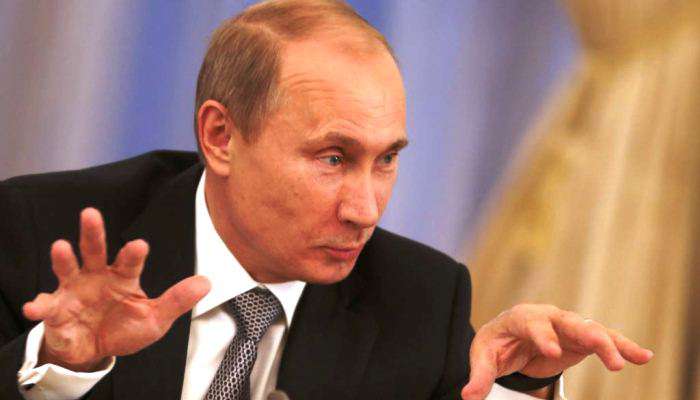Putin’s Wunderwaffe
By Andrei Piontkovsky March 22, 2018

The times are changing and so is Russian President Vladimir Putin. Back in 2014, when Russia invaded Ukraine, Putin was inebriated with the unexpected astounding success of his Crimean operation and gutless response of the West. He had never expected that his action in Ukraine, which was intended to keep this country in the Moscow’s orbit of corrupt regimes, would trigger such a great wave of nationalistic exaltation in Russia which would turn him into a semi-mythical figure, a hero who came to restore Russian national might and glory. Even the liberal opposition and imprisoned leftist leaders unanimously joined the ecstatic crowd praising the Putin’s action. Never in the long history of his reign, Putin could feel so close to claiming the title of Russian Messiah.
However, with the Ukrainian gamble, the Russian President has opened a can of worms. The nationalistic paranoia lifted the lid and any hint of stepping back in front of a foreign enemy would provoke a charge of high treason and accusations of being a fake Messiah.
Meanwhile, after such a promising beginning dubbed the “Russian Spring,” a chain of misfortunes and failures followed. The majority of ethnic Russian and Russian-speaking citizens of Ukraine remained loyal to their country and rejected Putin’s siren songs of the “Russian World.” As a result, the ambitious project of “Novorossiya,” which implied the territorial grab of a half of Ukraine all the way from Kharkiv to Odessa, shrunk to a puny sliver of land in the east of Ukraine controlled by pro-Russian separatists. No less misfortunate was Putin’s venture in Syria, which was supposed to distract national attention from the failure in Ukraine. After declaring three times victory and withdrawal of Russian troops from Syria, Mr. Putin had to face the music of the Deir ez-Zor debacle, were more than three hundred of Russian fighters were killed in February by the U.S. artillery and aircraft (by the way, if confirmed this number exceeds all the Soviet losses in clashes with Americans during the entire Cold war.) Finally, the hated Anglo-Saxons began to threaten Kremlin with a seizure of multiple assets in the West, which belong to Putin’s close friends and relatives: only in the U.S., these assets’ combined value exceeds $1 trillion. Closeness to Putin becomes toxic for Russian elites. Their bitter disappointment with Putin echoes with the deep discontent of Russian nationalists, who volunteered in great numbers to fight in Ukraine and now feel betrayed. Their spokesman, Russian fascist philosopher Alexander Dugin ceased praising Putin and reversed his position on the President.
Russia-watchers have noticed, that whenever Putin feels he is in trouble, he tends to disappear for a long time. This happened when Russian opposition leader Boris Nemtsov was killed, and the pattern was repeated after the Deir ez-Zor disaster when Putin “got cold” and was absent for two weeks (officially, he got sick for the first time in 18 years of his presidency.)
He came back with a new agenda for the rest of his presidency for life. Until recently, the Putin we knew was trying hard to reach a deal with the West, a sort of a new version of Yalta. After being kicked out from G-8, Putin’s active meddling in Syria, North Korea and elsewhere had only one message to the Western leaders: you need Russia (and me personally) to tackle these problems, bring me back to the club of world leaders as an equal partner and recognize my absolute dominance over the zone of my exclusive interests ( at least in Ukraine and the rest of the post-Soviet space) It seems that now he has abandoned this futile hope and moved to the “Russia as a sieged fortress” scenario.
Now he wants a confrontation with the West, from this day on he is willing to crank up the level of risk and is much more dangerous than he used to be. This agenda will help him to unite the «elites» around himself and keep the power for life.
But what resources besides unique Russian spirituality can he use to confront the NATO alliance, which is many times stronger than Russia economically, militarily, and technologically?
Actually, Putin has a Wunderwaffe, and he has displayed it in a number of interviews earlier this month. Of course, we are not talking about ridiculous videos he showed in his address to the Federal Assembly. Putin’s wonder weapon is his nuclear blackmail, his willingness and readiness to strike first, his complete disregard of the value of human lives, both Western and Russian ones, which he has repeatedly shown before.
Lately, he has incessantly and with gusto repeated with graphic detail depiction of him personally launching a nuclear attack against the West.
His blatantly defiant poisoning of a fugitive Russian spy with a chemical weapon was the first step in his special operation to prolong his presidential term through the rest of his life. He has deliberately left plenty of evidence to state urbi et orbi: I, Vladimir the Terrible, did it!
By doing this Putin killed two birds with one stone: the level of confrontation with the West went sky-high, while the world starts to believe that he really is a monster ready to use the weapons of mass destruction.